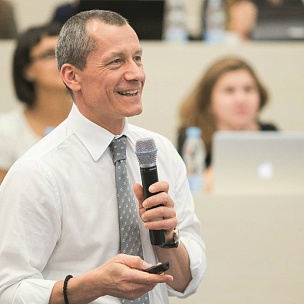Master the New Logic of Competition
To succeed in the 2020s, companies will need to put aside the old rules of the game and compete on multiple new dimensions.
- In a dynamic and complex environment, planning and predicting won’t necessarily lead to business success.
- Successful companies in the coming decade will compete on their ability to learn faster than their rivals, adapt to constant change, imagine entirely new possibilities, and collaborate in business ecosystems.
Design the Company of the Future
Today’s organizations were created for stability. Tomorrow’s must be built for change.
- As the familiar paths to business success disappear, survival depends on the ability to learn and adapt. Indeed, the future of business hinges on learning.
- Technology will help companies gain insight from data, but companies still need people. It takes a new kind of enterprise to figure out the most potent combination of artificial and human intelligence.
Apply the Science of Organizational Change
Large transformation efforts often fail, so why even try? Because standing still is not an option.
- Companies must change even when things are going well. Indeed, the capacity for continual change is a critical imperative for business success in the 2020s.
- Business leaders can turn change into an opportunity. There’s no recipe to follow for transformation, but data and analytics make it possible to decode what works and what doesn’t.
Embrace the Business Imperative of Diversity
Diversity isn’t just a moral issue. In the business world, as in the natural world, diversity is a crucial source of strength and adaptability.
- Research shows a link between a company’s diversity and its capacity for innovation and resilience.
- For business success, it’s not enough to increase the diversity of the workforce. Leaders also need to create an environment where new perspectives are welcomed and encouraged.
Optimize for Both Social and Business Value
The future of business must be about more than business.
- As the public’s trust in business wavers, political and economic uncertainty around the globe increases, and climate change intensifies, companies must be part of the solution by creating social as well as economic value.
- Companies will thrive in the 2020s—and beyond—only if they have sustainable relationships with the social, political, and environmental systems they participate in.






